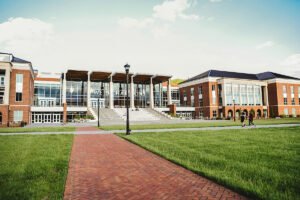
March 12, 2020; Chronicle of Higher Education
One year ago, the Varsity Blues college admissions scandal erupted, involving 50 people at eight universities. Six of these were private nonprofits: namely, Georgetown, Stanford, the University of San Diego, University of Southern California (USC), Wake Forest; and Yale. Two were public schools—the University of California, Los Angeles (UCLA) and University of Texas, Austin. At the time, the question on our minds at NPQ was whether we would “take this cultural crisis at the heart of our sector seriously…or, will the latest college admission scandal be dismissed, once again, as just a few bad apples in an otherwise functional system?”
A year later, Andy Thomason, Nell Gluckman, and Lindsay Ellis take a look to see how universities have responded. As Thomason, Gluckman, and Ellis recall, the heart of the admissions scandal involved an admissions “side door” that exploited “two weak points in the admissions pipeline—the security of SAT and ACT tests, and the ability of coaches and athletics administrators to virtually guarantee admission,” which William Singer, through his faux nonprofit, the Key Worldwide Foundation, used to guarantee paying clients admission for their children to universities.
Of course, more broadly, the scandal made obvious the corruption of a system that, far beyond the particulars of Varsity Blues, is well known to have stacked the deck in favor of the well connected. As the Chronicle writers note, the Varsity Blues scandal was, in a sense, a “logical development in the long-running auction of prestige that casts America’s upper crust as the bidders, and elite colleges as the fast-talking salespeople.”
Who has been held accountable? One thing that immediately becomes clear from the Chronicle’s list, which draws on this larger US Department of Justice indictment list, is that the only university officials directly held accountable were athletic staff.
Sign up for our free newsletters
Subscribe to NPQ's newsletters to have our top stories delivered directly to your inbox.
By signing up, you agree to our privacy policy and terms of use, and to receive messages from NPQ and our partners.
| Name | Job title | Institution | Personnel action | Legal status |
| Donna Heinel | Senior associate athletic director | USC | Fired | Pleaded not guilty to several counts of conspiracy |
| Ali Khosroshahin | Women’s soccer head coach | USC | Not employed by USC when the scandal broke | Pleaded guilty to conspiracy to commit racketeering |
| Laura Janke | Assistant women’s soccer coach | USC | Not employed by USC when the scandal broke | Pleaded guilty to conspiracy to commit racketeering |
| Jovan Vavic | Head water polo coach | USC | Fired | Pleaded not guilty to several counts of conspiracy |
| Rudolph Meredith | Head women’s soccer coach | Yale | Not employed by Yale when the scandal broke | Pleaded guilty to two charges and agreed to become a cooperating witness |
| Gordon Ernst | Head tennis coach | Georgetown | Resigned from post as head women’s tennis coach at the University of Rhode Island | Pleaded not guilty to several charges |
| Jorge Salcedo | Head men’s soccer coach | UCLA | Fired | Pleaded not guilty to two charges of conspiracy |
| William Ferguson | Head women’s volleyball coach | Wake Forest | Resigned | Pleaded not guilty to two charges of conspiracy |
| John Vandemoer | Head sailing coach | Stanford | Fired | Pleaded guilty to conspiracy to commit racketeering |
| Michael Center | Tennis coach | University of Texas at Austin | Fired | Pleaded guilty to conspiracy to commit mail fraud and honest services mail fraud |
| Lamont Smith | Head men’s basketball coach | University of San Diego | Resigned from post as assistant coach on the University of Texas at El Paso men’s basketball team | Not charged with a crime |
By contrast, accountability for admissions staff is conspicuous in its absence.
Last year, shortly after the scandal emerged, the Chronicle of Higher Education asked a number of schools, both those implicated in the scandal and those that were not, if they were changing their admissions policies. Checking in a year later, here is what they learned:
- Yale: Yale implemented indictment list to avoid athletics-based admissions fraud last August. But Jeremiah Quinlan, dean of undergraduate admissions and financial aid, told the Chronicle that he couldn’t assess the reforms’ impact until this summer, after the admissions cycle is complete.
- Penn: Eric J. Furda, dean of admissions, pledged to establish “checks and balances” to athletic-based admissions but did not respond this spring to the Chronicle’s requests for an interview.
- Johns Hopkins: Last year, David Phillips, vice provost for admissions and financial aid, pledged to reform athletics-based admissions practices, but he, like Furda, did not respond to interview requests.
- Dartmouth: Last year, the university pledged to reform athletics-based admissions practices, but this year Lee Coffin, vice provost for enrollment and dean of admissions and financial aid, declined an interview request. Dartmouth’s spokeswoman, Diana Lawrence, told the Chronicle in an email, however, that new protocols were going “smoothly.”
Of course, these reforms, even if fully implemented, would hardly alter an admissions regime that largely favors the advantaged.
This disparity isn’t lost on admissions officers. Thomason, Gluckman, and Ellis note that a conference of “150 college-admissions officers, researchers, and counselors held this January focused on “reclaiming public trust in admissions and higher education.” As they write, “it’s long been assumed that admissions officers make decisions in full awareness of how much the parents of applicants have donated or are capable of donating to the institution.”
Prominent calls to reform practices such as legacy admissions have been made. Action, however, has been slow. It would appear that after the Varsity Blues wakeup call, more universities than not have chosen to hit the snooze button.—Steve Dubb











